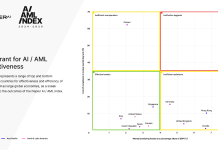From: RegTech Analyst
The number of money laundering fines around the world doubled in 2019, according to new research from Encompass, the RegTech startup.
The company found that the number of anti-money laundering (AML) penalties jumped from 29 in 2018 to 58 in 2019.
At the same time, the total amount fined grew from $4.27bn to $8.14bn, making 2019 the year with the highest value fined since 2014 when a total of $10.89bn was fined.
While US regulators were the most active and handed out 25 fines totalling $2.29bn, the largest fine was handed out in France and was worth $5.1bn.
UK regulators were the second most active fine givers in 2019, handing out 12 fines with the total value of $388.4m.
Encompass CEO and co-founder Wayne Johnson was unsurprised that the US and the UK were leading the way when it came to the number of penalties served up.
“Given that these two countries have transparent regulatory cultures and active regulatory bodies, we expect we shall continue to see the largest number of fines originate from here, but we are seeing activity from increasing numbers of jurisdictions as time goes on,” he said. “For example, in 2019, penalties were handed out by 14 countries, compared to just three a decade ago in 2009.”
For Johnson, the research also highlighted that the amount fined is steadily rising, with $1bn fines becoming more common.
“Historically, the majority of these fines have been given to banks, but this year the proportion was less than half, demonstrating that money laundering is now recognised as a general business issue, not just one that is specific to financial services,” he said.
“Regulators in the gambling [and] gaming sector were particularly active in 2019, handing out five fines, all of which were well over $1mn and the highest being $7.2m. Interestingly, four of these were in the UK, demonstrating a crackdown here.”
Johnson concluded, “We are not expecting the spotlight on money laundering to dim. The continued and increased focus on this area highlights the severity with which it is viewed at a global level, which is not surprising given the negative economic and societal repercussions it can have.”











